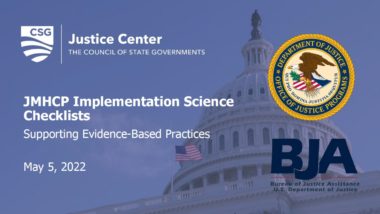Implementation Science Checklists and Evidence-Based Practices
Hosted by The Council of State Governments (CSG) Justice Center and the U.S. Department of Justice’s Office of Justice Programs, Bureau of Justice Assistance
As people who have behavioral health needs continue to encounter criminal justice and behavioral health systems across the country, there is a greater need to ensure that evidence-based practices (EBPs) are implemented with fidelity. By taking a research-based approach to implementation, known as implementation science, agencies can improve or strengthen the EBPs they deliver for people in the criminal justice system who have behavioral health needs. The Justice and Mental Health Collaboration Program (JMHCP) Implementation Science Checklist Series is intended for professionals who direct and oversee programming in the fields of corrections, community corrections, and behavioral health and social service agencies. This webinar will introduce the principles of implementation science and provide an overview of the JMHCP Implementation Science Checklist Series. County representatives will discuss their use of implementation science principles in rolling out EBPs in their jurisdictions.
Speakers:
- Lisa Potter, Director, Diversion Initiatives, Fairfax County, VA
- Dr. Faye Taxman, Professor, George Mason University, Schar School of Policy and Government
- Demetrius Thomas, Deputy Program Director, Behavioral Health, CSG Justice Center
- Sarah Wurzburg, Deputy Division Director, Behavioral Health, CSG Justice Center
- Laura Yager, Fairfax County Adult Detention Center, VA

Find other events
You might also be interested in
The sharp rise in school shootings over the past 25 years has led school officials across the U.S.…
Read MoreA three-digit crisis line, 988, launched two years ago to supplement—not necessarily replace—911. Calling 988 simplifies access to…
Read More


















